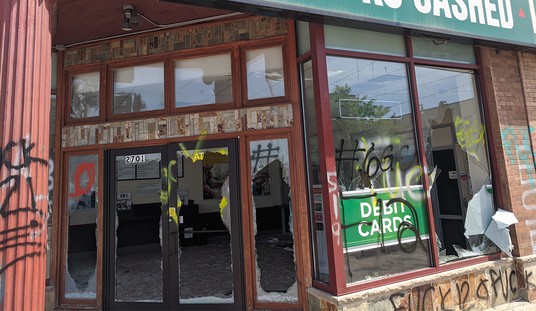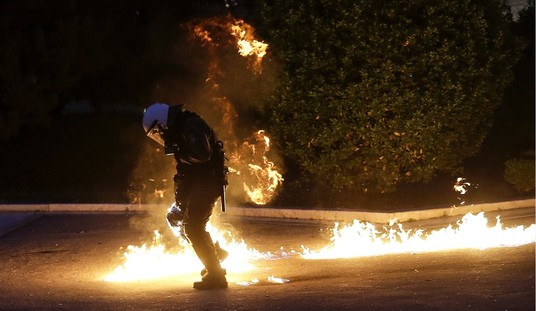Just before Christmas, I wrote at some length about the situation in Greece, sharing extensive personal observations from our visits in recent years. At the time, I confessed:
It pains me to share these observations about daily life in a country where the government has long since doubled down on unsustainable spending complemented by cronyism, corruption, and a pervasive and out-of-control sense of entitlement. Now the party is ending, as it becomes apparent to all — both those who wish it to stop and those who want it to continue, consequences be damned — that the Greek government has, to use Margaret Thatcher’s prophetic phrase, simply run out of other people’s money.
While most posted comments agreed with my article, the one criticism noted by a few readers was that my conclusion — in which I expressed hope that “a country with the rich heritage of Greece should be up to the challenges” — was too rosy. I now provide an update, and I regret that it cannot be more encouraging.
As most readers know, this month the Greek parliament voted to approve new austerity measures demanded by the country’s creditors. The outcome of the parliamentary vote was never seriously in doubt, as the majority PASOK party (the Socialists) and the Conservatives had committed to approval. Between them, they had more than enough votes even in the face of some last minute defections.
Even after the vote, European creditors demanded that Greek political leaders sign pledges that the austerity measures will actually be implemented, whatever the result of the general election coming in April. Having learned the hard way, the eurozone bankers and politicos are skeptical that the Greeks will live up to their bargain.
Whether Greece ultimately remains in the euro or ends up opting to default and “drachmatize” its euro debts, it faces very serious challenges in the near term. Consider events in Athens, and their likely ripple effects in the months ahead.
Occupation Turns to Devastation, Unchecked by Law Enforcement
From personal contacts and press reports alike, the news from Greece in recent days has been demoralizing. As I wrote in December, the scene in central Athens has been ugly for a long time, with continuing negative economic effects on the city’s nicest hotels and shopping areas. Things are now going from bad to very much worse.
News reports consistently stated that “thousands” of demonstrators “clashed with police” in central Athens. The “thousands” were evidently among the “tens of thousands” reported to have massed “outside pariliament” in “a rally against austerity plans being debated by lawmakers.” One report, in the New York Daily News, estimated that “more than 100,000 protestors” were involved.
Whatever the total number, surely hundreds if not several thousand were involved in property destruction, looting, and attacks on police and assorted banks and retail establishments. Although vandalism and violence have characterized general strikes in Greece, especially since the struggle against austerity measures began in earnest, this month’s eruptions appear to have gone far beyond anything seen before.
The property destruction and looting were appalling. One television report said that “nearly 50 buildings” were firebombed, dozens were gutted by fire. According to the Daily News, “looters smashed dozens of shops in the worst riot damage in years.” In other reports, store owners were quoted saying, in effect, we are closing and we will not reopen. (As I noted in December, the mobs are indiscriminate; they destroy small local businesses along with banks and brand names.)
As in previous mob attacks, marble facades — and the steps of elegant hotels on Syntagma — were smashed into rocks then thrown at police and at the windows of stores and hotels. This time, the damage is more extensive than ever.
For those who’ve not been to Athens, let me offer a comparison to give you some perspective. What happened in Athens this month was as if, in Washington, D.C., protestors had firebombed and trashed office buildings, hotels, restaurants, and shops around Lafayette Park, across from the Executive Office Building, and along Pennsylvania Avenue on both sides of the White House. If you are acquainted with this part of Washington, then suppose the Old Ebbitt Grill, the Hay Adams and Willard hotels, and the retail and office establishments in and around the heart of Washington were smashed and burned. Suppose further that photos of the gutted buildings — with the White House in the background in many shots — were spread across the internet for Americans across the country, and friends and foes around the world, to see. That’s the equivalent of what happened in Greece.
One aspect of these tragic events that deserves much more attention is the gross inadequacy of the police response. Why do we not read and hear more about the virtual absence of a serious effort by law enforcement authorities to prevent what amounts to the destruction of the heart of Athens? Speaking to the parliament, Prime Minister Lucas Papademos said, “Vandalism, violence, and repression have no place in democracy and won’t be tolerated.” But vandalism and violence were allowed to prevail in Greece last weekend.
On this point, consider that press estimates of the number of protestors arrested or “detained” range from 45 to 70 or so. Even those low numbers likely exaggerate the forcefulness of the response. As a close Greek friend who’s observed this drill over the past couple of years told us by telephone: “They arrest very few people, and then a few hours later they release them.”
It is inconceivable that the Greek police or military could not have prevented what occurred. After all, they have had over two years of experience with this very same crowd. The Greek authorities surely know full well who the instigators of violence and destruction are. They have the resources to prevent the mobs gathering, to disperse the crowds once gathered, and most importantly to arrest and imprison hundreds of the most violent. It is a travesty that this did not occur.
As I wrote in December, the Greek police are themselves members of unions that have benefited from the past profligacy of the Greek government. We have heard from a number of Greeks that, when the police allow the mobs to have their way, it has emboldened “the thuggish elements among the protestors.” This, in my view, was a major contributing factor in this month’s debacle.
Greek friends tell us their elderly neighbors in Athens, who recall the worst of the Nazi occupation more than 60 years ago, are despondent. Some say, observing the smoke and flames and chaos: “It is just like the War.” Perhaps that overstates the severity of the situation, but it is telling that the comparison is drawn at all.
In any event, contemplate a straightforward question that is crucial to the Greek economy: How’s the tourist trade going to be this year, after the smash and pillage spree? We’re told that some cruise lines have already taken Athens off their list of port calls. That is not a surprise. After all, cities filled with bombed-out and gutted store fronts are not generally a magnet for travelers.
Is There a Message Here for Americans?
One might fairly ask: does this have anything to do with us? Greece is a small country, and far away. Perhaps its crises deserve no more than the relatively thin coverage they receive in our media.
Still, by this point we should all be sitting up and paying attention. For, like it or not, what’s happening in Greece is an unhappy harbinger of things to come in our country, if we continue to follow the same irresponsible path charted by our friends in Athens.
From its entry into the eurozone, Greece has lived beyond its means. The European Union contributed to the problem, ignoring in the case of Greece its own prohibition on lending to countries with debt-to-GDP ratios higher than 60%. Greece’s ratio is now the highest in Europe, having steadily escalated to more than 160%.
Current austerity measures aim at bringing the Greek government debt-to-GDP ratio down to 120% by 2020. But with the country’s GDP falling at an accelerating pace — down at a 5% annual pace, as I noted in December; and now, only two months later, falling at a 7% annual rate — that will be tougher and tougher to achieve.
Here in the United States, under the current administration, our own ratio has roared upwards from 70% in 2008 to about 110% currently. (For some handy charts on this sad subject, see http://www.usgovernmentdebt.us/.) Against a GDP of just over $15 trillion, adding debt at President Obama’s rate of about $1.3 trillion annually will have us past 120% (assuming a stable GDP) in another year or so. Catch Greece? Yes we can!
Moreover, although its unsustainable spending problem was no secret, until recently Greece did not eliminate a single government job. Government employee positions, pay, and pensions all were protected, even as the country’s private sector was bleeding jobs in a big way.
In the U.S. we’ve been on a parallel path. President Obama has created hundreds of thousands of federal government jobs, while his private sector “job creation” efforts have essentially transferred billions of tax dollars to campaign donors (green energy companies) and unions (GM, Chrysler). At the same time, his policies have killed massive numbers of private sector jobs in energy production and assorted smokestack industries, in “red states” in particular.
In sum, there are ominous parallels between the U.S. and Greece. When politicians engage in the politics of envy and class warfare, seeking to divide the electorate and promote dependency, unrealistic expectations are created about the sustainability of excessive spending. We’ve now seen, courtesy of this month’s rampages in Greece, how things can get very ugly when even the most unreasonable expectations are dashed. Just because more than 50% of the people are “takers,” and vote that way, does not mean the unsustainable can continue indefinitely.
Here at home, we have electoral candidates and media organizations who for political ends are encouraging the same mentality that has led to chaos in Greece. If this goes on, it is not likely to end well.
One Distinction That May Not Make a Difference
I’ll note one major distinction between Greece and the U.S., and explain briefly why it provides us no solace.
In Greece, the culture of corruption is far worse than it is here (although, ours is ramping up smartly in this administration); one manifestation of this culture is extremely poor tax compliance. The Greeks can raise taxes in an attempt to increase revenue, but they have a very poor record of actually collecting taxes from businesses and individuals alike, at all income levels.
Higher tax rates do not result in higher revenue in Greece. Rather, tax increases simply drive businesses and jobs further into the well established “cash” economy, where jobs and incomes are neither reported nor taxed.
By contrast, in the United States we have a very effective tax collection apparatus, and a strong tax compliance culture. Here, the people who make the most money already pay far and away the most taxes. Higher tax rates do not simply encourage even more adroit tax evasion. But neither do they necessarily result in higher revenues, as numerous studies have shown.
In the U.S., as tax rates go up, those in a position to choose often opt for lower incomes (call it the John Galt effect, or what you will). For most producers, migration to a robust cash economy is not a real option here. Thus, when taxed more, the most productive may produce less. Here, this can not only reduce their own tax obligations, but also lead them to eliminate jobs in their businesses — so that the taxes paid by workers are also lost, along with the workers’ jobs.
So, the view that our superior tax compliance culture will somehow enable us to continue the party that has come crashing down around the Greeks is, in my view, seriously flawed.
Therefore we should follow events in Greece carefully, and pay close attention to our own president and our tax and spend politicians. Thus far, it does not appear that our “leaders” are learning the lessons of Athens. Perhaps the lesson for us is that we need new leaders.
Update: “Greece: More in the same vein“









Join the conversation as a VIP Member